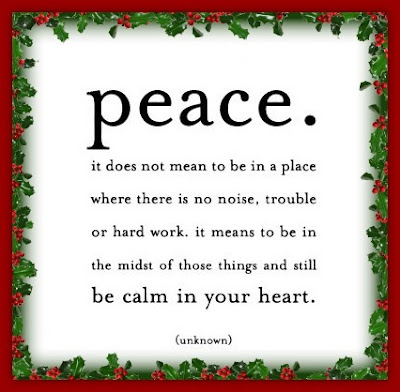Here we are once again, at the end of the year in the
Christmas Season, a season of opposing views, of strange discord that boggles
the mind and does not make sense. It’s
once again the season of opposition of the spiritual and the commercial. We try to blend the two – the season of
peace, of the legend of the Christ-child, of inner quiet and spiritual
awakening and renewal… and then the season of “giving”, of Christmas trees, lights,
of presents, giving and receiving, of generally adorning our environment to
help us “get in the spirit” to feel something special that we hope will
be fulfilling, warm, and maybe nostalgic and encouraging. I like this Zen Habits post.
We all have seen our favorite Christmas Movies… A Christmas
Carol, It’s a Wonderful Life, A Christmas Story, The Grinch, Elf, etc. They all tell a story of the different views
on the world, of seeing beyond the world that we know, perhaps of facing
hardship or shaking us out of our complacency, of realizing the true meaning of
life, of coming to terms with who we really are, of our situation… what we have
perhaps become… and seeing it clearly.
Perhaps there is a beautiful transformation, as with Scrooge following
his visit by the ghost of Marley and the three Christmas ghosts. A story of a cold, bitter heart transformed
by insight of the fleeting nature of life and existence, and a glimpse of that
warmth which is brought by genuine caring and love, and renewed with a spirit
of giving and gratitude. Ah, the
stories which give meaning to the Season.
Sadly, not all of us are open to the potential of
transformation. The USA was shook last
week by yet another mass school shooting, this time very young children were
the victims. It was a truly horrible,
cruel and tragic event. There is
something deeply wrong with us, with our society, which creates the possibility
for something like these events to happen.
There is I think a deep spiritual emptiness within us, something that we
long to fill. We know that there are
the basic necessities for humans to fully develop and thrive… Maslow pointed
these out, and it does point to the fact that there likely are aspects of life
that just can’t be realized without a foundation of Love… for others and also
importantly, for ourselves. Not in a
prideful sense, but an accepting, nurturing awareness for ourselves.
There will always be an emptiness if this
cannot be met or recognized. We need to
be able to reach out and find that Love for ourselves. I think there is much
truth in this, that love and belonging are essential, and are the middle bridge
of development which needs to be fostered in our world, if we are to have a
chance of real growth. I know that I’ve
been blessed to have experienced love as a child, and was able to grow to
experience aspects of Maslow’s higher esteem and self-actualization. What allows us to recognize morality without
these notions of love and compassion?
 I was blessed during the writing of this post by a childhood
memory of a small story book I was given at Christmas, The Gift of the Magi, by
O. Henry (William Sydney Porter). My parents
struggled to make ends meet when we were young, and my father liked to give us
used books which he felt were valuable.
I remember this one, and I wish that I still had it today. I fortunately recall the memory of this
particular gift. The touching story of
loving self-sacrifice ends with these words:
I was blessed during the writing of this post by a childhood
memory of a small story book I was given at Christmas, The Gift of the Magi, by
O. Henry (William Sydney Porter). My parents
struggled to make ends meet when we were young, and my father liked to give us
used books which he felt were valuable.
I remember this one, and I wish that I still had it today. I fortunately recall the memory of this
particular gift. The touching story of
loving self-sacrifice ends with these words:"The magi, as you know, were wise men--wonderfully wise men--who brought gifts to the Babe in the manger. They invented the art of giving Christmas presents. Being wise, their gifts were no doubt wise ones, possibly bearing the privilege of exchange in case of duplication. And here I have lamely related to you the uneventful chronicle of two foolish children in a flat who most unwisely sacrificed for each other the greatest treasures of their house. But in a last word to the wise of these days let it be said that of all who give gifts these two were the wisest. O all who give and receive gifts, such as they are wisest. Everywhere they are wisest. They are the magi."
The Gift of the Magi, by William Sydney Porter
Gifts do not need to be grand at Christmas, I have come to
truly appreciate simplicity… it is about quality, and not quantity. I like to think that my father recognized
the importance of love and self-sacrifice and wanted me to read the story and
feel it the way he did, and to also feel it and live it. I am also fortunate to say that my mother is
still alive today, and she has demonstrated the ideal of the Gift of the Magi
story throughout her entire life, a living example of love and self-sacrifice
for her children and those around her.
I give thanks for my family and friends around me.
I hope all may find new peace, wisdom, joy and enlightenment
this Season, and throughout the New Year.












